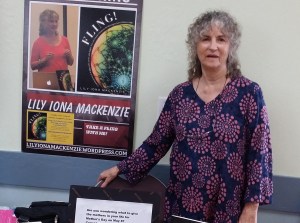 Most writers have day jobs and frequently have difficulty finding writing time. How do you manage it?
Most writers have day jobs and frequently have difficulty finding writing time. How do you manage it?
For me, it isn’t a matter of managing it. Writing is as essential to me as eating, so I must find time to write each day. I’ve discovered, amidst teaching writing part time at the University of San Francisco (USF) and other colleges , helping to raise two stepchildren, serving as vice president of USF’s part-time faculty union, and other responsibilities, that if I write a minimum of one hour a day, I can accomplish a lot!
How long have you been writing and do you perceive your writing to have evolved in any particular way that you would like to share?
I took on writing seriously in my late twenties. I started out focusing on poetry, and it still forms the foundation for my work. But I also am interested in short and long fiction, having written four+ novels and numerous short stories. I also love writing essays, from travel writing to book reviews, to critical essay
What appealed to you about being a part of the Pact Press Speak and Speak Again anthology?
Having grown up in Canada, a country that embraces social justice, I moved to America in 1963 eager to support the Civil Rights Movement, as well as the feminists who were addressing all the inequalities women and others had suffered for centuries. Participating in this anthology seems a natural outcome of my life-long interest in pushing for a just society.
What do you think is the responsibility of the writer in today’s polarized environment?
When I write, I don’t think about the polarized environment I live in. In fact, I never think about audience. As a writer, I try to dive below the social surface and capture some truth about what it means to be human. I don’t write for a particular audience or movement or particular ideology. I write to generate poetry, fiction, etc., that originates deep within myself and resonates with readers no matter what their backgrounds may be.
Do you think that self-revelation is part of the writing process?
I don’t think we can be serious writers without undressing completely, externally and internally, in our works. How else can we explore the vastness of life and its many dimensions? While we may be inventing characters and situations, fragments of our selves can’t help but be embedded in our work. Some writers are more autobiographical than others and therefore more revealing in that sense. But even in my novel Curva Peligrosa, to be released in 2017, which is not at all autobiographical, I reveal myself in the ideas I explore there. I am not at all like the amoral main character, Curva Peligrosa, but I do share some of her attitudes and beliefs. So the autobiographical gets intertwined with the fiction, and a writer can’t avoid being revealed in the process.
Lily Iona MacKenzie, a Bay Area resident who currently teaches memoir writing to older adults at the University of San Francisco’s Fromm Institute, has published poetry, short fiction, and essays in over 150 Canadian and American publications. Her poetry collection All This was published in October 2011. Novels: Fling! was published in July 2015. Curva Peligrosa will be published in 2017. Freefall: A Divine Comedy will be released in 2018.
Connect with Lily:


 Regal is a marvelous House, founded as it is on Jaynie’s passion for involving literature and her devotion to the authors who write it. When Jaynie asked me to help her lay bricks as the Senior Editor, I was—and still am—over the moon (don’t worry; there’s Internet here and manuscripts reach me even through the sublunary atmosphere). Jaynie and I share a desire—one that drives many independent publishers—to return to a publishing ethos in which authors are treated with courtesy and respect and their works are edited conscientiously and with great care. We meld traditional, intense, editorial engagement with the technology that enables small presses to publish noteworthy literature that might otherwise languish undiscovered and unread.
Regal is a marvelous House, founded as it is on Jaynie’s passion for involving literature and her devotion to the authors who write it. When Jaynie asked me to help her lay bricks as the Senior Editor, I was—and still am—over the moon (don’t worry; there’s Internet here and manuscripts reach me even through the sublunary atmosphere). Jaynie and I share a desire—one that drives many independent publishers—to return to a publishing ethos in which authors are treated with courtesy and respect and their works are edited conscientiously and with great care. We meld traditional, intense, editorial engagement with the technology that enables small presses to publish noteworthy literature that might otherwise languish undiscovered and unread.


